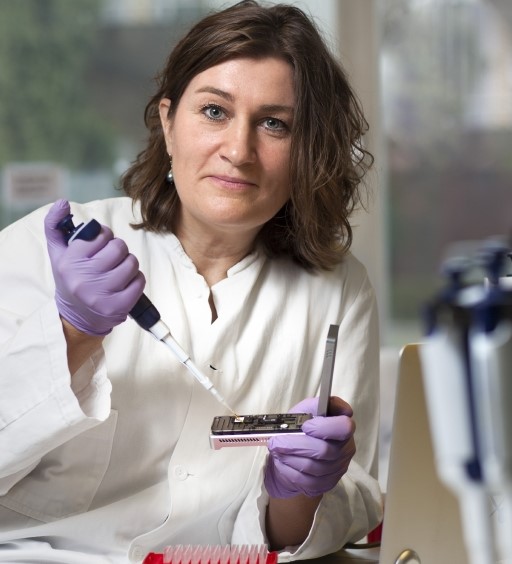Genetic superheroes carry key information to prevention of cardiovascular disease
Why do some people stay healthy despite a high level of cholesterol? The answer is that they may be genetic superheroes. Professor at Aalborg University, Mette Nyegaard is performing research into rare gene variants and how they may prevent development of cardiovascular disease.

Driven by a deep fascination of how we as human beings differ, Mette Nyegaard, Professor at Health Science and Technology at Aalborg University, performs research of genetic variations and how they are related to phenotypes. Why do some people stay healthy well into their years despite a high cholesterol level? How is it possible for an elderly person to drink alcohol, be overweight and yet not suffer from this lifestyle? These are some of the questions that Mette Nyegaard tries to answer in her research.
“If we can find the beneficial gene variants that these people carry, we can imitate the effect with medication, enabling the rest of us to have the same favorable health benefits,” says Mette Nyegaard, Professor, Aalborg University.
Large biobanks provide overview of the entire genome
Mette Nyegaard argues that a game changer within her field of research is improved technology making it cheaper and faster to sequence DNA, resulting in enormous datasets of genetic variation from the entire human genome linked with health data. Mette Nyegaard is especially thrilled about rare gene variants that protect us from heart disease. People who are lucky enough to be born with these variants can be perceived as genetic superheroes.
Her current research is primarily based on three large biobanks, FinnGen in Finland, UK Biobank in England each having around half a million people’s genetic records, and a Danish cohort of patients with symptoms and risk factors for coronary heart disease, which have undergone detailed cardiac imaging analysis (Dan-NICAD cohort).
Project will invent drug to prevent cardiovascular disease
She is working on a project in continuation of a gene found some years ago called PCSK9. People living with a beneficial version of this gene – a version that actually leads to the gene losing its function – have low cholesterol for life. On this basis, the medical industry invented the PCSK9 inhibitor which has become a big block buster, lowering the cholesterol level for many people.
Together with Novo Nordisk and researchers at Aarhus University, she is now searching for other beneficial gene variants, which protect us from cardiovascular disease. Other mechanisms than LDL cholesterol are at stake for cardiovascular disease.
“We are now investigating a new gene, that looks like a new PCSK9 with a protective effect but working through another mechanism. We study what effect this lucky variant has on protein in order to learn what effect to mimic to inhibit cardiovascular disease and for Novo Nordisk to invent a drug on this basis. In this case, the variant is not associated with any other common disease and thus is a very attractive drug target, says Mette Nyegaard.
She concludes that nature has created a lot of genetic variation allowing us to develop medication based on what nature already permits as opposed to removing a gene in mice and evaluate the outcome. Furthermore, research based on large-scale datasets would not have been possible 10 years ago. Technological advances and the fact that many people are willing to share their medical records and have their DNA sequenced has enabled research into rare genetic variants.
The THOR project is performed in collaboration with:
Jacob Bentzon og team, Arhus University
Michal Nyberg og team, Novo Nordisk
Mette Nyegaard and team, Aalborg University
Morten Bøttcher og team, Aarhus University Hospital
Facts on cardiovascular research at Aalborg University & Aalborg University Hospital:
Four research groups perform research within following key areas:
- Cardiovascular diagnosis and monitoring
- Cardio-acoustic sensing
- Trombosis
- Advanced EKG- interpretation
- 3D ultrasound
The cardiovascular research at Aalborg University and Aalborg University Hospital is characterised by the close cooperation between engineers and researchers within the cardiovascular field. Through their great expertise in applying and analysing great amounts of data through data analysis methods such as signal processing, pattern recognition and artificial intelligence (AI), researchers within this field are able to efficiently diagnose and predict potential future disease.
Facts on Mette Nyegaard:
- Professor of personalized medicine at Department of Health Science and Technology, Aalborg University, 2021
- Associate Professor at Aarhus University – focus on complex disease genetics, 2012 - 2021
- Postdoc., Institute of Human Genetics, Aarhus University, 2006 - 2012
- Postdoc., Stanford Medical School, CA, USA, 2003-2006
- PhD in human genetics, University of Southern Denmark, 2003
- M.Sc in Chemistry-biotechnology, Aarhus University, 1997